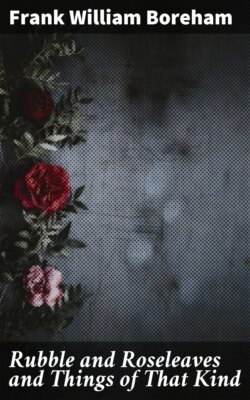Читать книгу Rubble and Roseleaves and Things of That Kind - Frank William Boreham - Страница 13
На сайте Литреса книга снята с продажи.
III
ОглавлениеTable of Contents
My second witness is Harold Glendinning. Harold was the minister at Port Eyre, a little seaside town close to the harbor's mouth. He had frequently asked me to exchange pulpits with him, and at last he had coaxed me to consent.
'Come early on Saturday,' he wrote, 'so that we may have an hour or two together here before I have to leave.'
Like Clarence Shadbrook, Harold was a widower. But, unlike Clarence, he was still young. His wife had faded and died after three short years of married life. His mother kept house for him at the manse.
I reached Port Eyre early on the Saturday. We went for a walk round the rocky coast before dinner; and in the afternoon Harold made preparations for departure.
'But, dear me,' he exclaimed, 'I haven't shown you your room. Come with me!' And he led me out into the hall and up the stairs.
The room was obviously his own. Photographs of his young wife were everywhere. Her presence pervaded it. The window commanded a noble view of the bay, and we stood for a minute or two admiring the prospect. We then turned towards the door.
'Treat the place as though it belonged to you,' he said. 'Make yourself perfectly at home. You're welcome to everything except—' He half-closed the door again.
'You'll understand, I know,' he went on, 'but don't use the armchair over there in the corner.' I glanced in the direction indicated by his gaze. A comfortable chair stood beside a small occasional table on which a lovely bowl of roses had been placed.
'It's her chair,' he explained. 'It used to stand by the fireplace in the dining-room. She sat there every evening, reading or sewing, with her feet resting on her campstool.' I noticed now that a folded campstool stood near the chair. 'Somehow,' he continued, 'the chair seemed to become a part of her. And after—afterwards—I couldn't bear to leave it there for anybody to occupy who happened to call; so I brought it up here. And, somehow, with the chair there, she doesn't seem so very far away. I'll show you something else,' he said; and, diving into a drawer near his hand, he produced an old magazine.
'I only found this afterwards,' he explained. 'At least I only noticed the marked passage. I saw it in her lap several times during the last week or two, and, in an off-hand way, I picked it up and glanced through it. But it was only after—afterwards—that I noticed that faint pencil-mark beside this poem.' He handed me the magazine, and, surely enough, I detected a mark, so faint as to be scarcely visible, beside some lines by L. C. Jack.
When day is done and in the golden west
My soul from yours sinks slowly out of sight,
And you alone enjoy the warmth and light
That once had seemed of all God's gifts the best;
When roses bloom and I not there to name,
When thrushes sing and I not there to hear,
When rippling laughter breaks upon your ear
And friends come flocking as of old they came;
I pray, dear heart, for sweet Remembrance sake
You pluck the rose and hear the songful thrush.
With laughter meet once more the merry jest
And great familiar faces still awake,
For I, asleep in the eternal Hush,
Would have you ever at your golden best.
'You may think it strange,' he concluded, as we turned to leave the room, 'but I often fancy that the chair in the corner makes it a little more easy for me to live in the spirit of those lines.'
